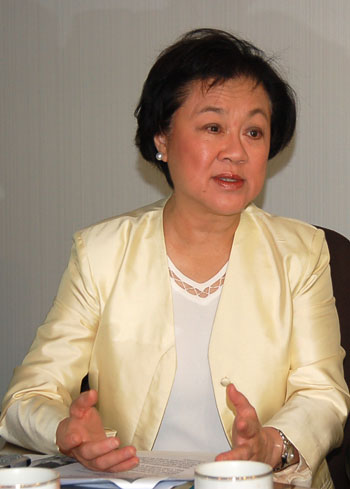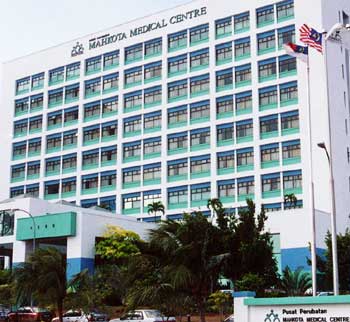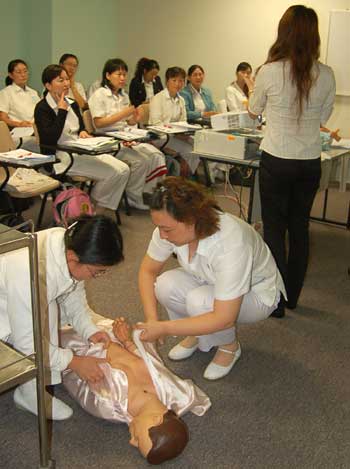
”MEDICAL TOURISTS from Indonesia looking for a lower cost alternative to Singapore are most likely to choose Malaysia,” says Dr Gan See Khem, executive chairman of Health Management International.
HMI owns a 49% stake of Malacca’s Mahkota Medical Center, one of the most profitable private hospitals in Malaysia.
The 235-bed tertiary care hospital received Malaysia’s Healthcare Services Industry Excellence Award from its Ministry of International Trade and Industry for two consecutive years in 2006-2007.
Most of its doctors are Malaysians trained in Singapore, says Dr Gan during a visit by 10 analysts, fund managers and traders to her office in Bukit Merah yesterday.
The facilities and medical equipment in Mahkota Medical Center are comparable to premier private hospitals in Singapore such as the Gleneagles, she says.
What lures Indonesian patients to the Mahkota is the fact that fees for most of its medical services, from doctors’ consultation and surgical procedures, drugs, rental of medical equipment to bed charges in Malaysia are half what they would have to pay in Singapore.
For this reason, Dr Gan expects HMI’s patient load to increase even as the global recession hits hard at the pockets of Indonesian medical tourists who patronize Singapore hospitals during boom times.
Malaysia attracted 386,000 medical tourists in 2007, of which 70% were Indonesians. Industry experts reckon this market will grow 30% a year to RM 584 million by 2010.

HMI has 9 marketing offices in Indonesia promoting Mahkota Medical Center.
Dr Gan, who holds a PhD in business administration from the University of Sheffield, UK, said HMI’s patient load rose during Asia’s last recession.
By 1H09 (ending December 2008), HMI will open a second tertiary care hospital in Johor, where there is a chronic shortage of operating theatres.
Named Regency Specialist Hospital, the 61%-owned subsidiary obtained its licence to operate in August 2008.
About 97% of HMI's revenue in FY08 come from the provision of inpatient and outpatient services such as laboratory, pharmacy or radiology, rental of operating theatres and other equipment in its specialist centers, as well as the sale or lease of medical suites to doctors.
The remaining 3% of revenues comes from accreditation programs for nursing professionals, as well as vocational training for healthcare workers.
Meeting a worldwide shortage of nursing professionals
Though education services is a small segment now, Dr Gan wants to increase its revenue contribution.
There is currently a worldwide shortage of accredited nursing professionals, especially in developed nations such as Singapore, Australia and North America.

Nurses from developing nations are keen on these jobs which pay far more than what they can get at home. For example, in China, they earn no more than Rmb 1,000 a month, versus up to S$2,000 in Singapore when allowances and other perks are thrown in.
However, nursing qualifications from developing nations are usually not recognized by developed nations.
Here’s where HMI fills the gap.
Its School of Nursing attracts Chinese nationals by collaborating with China's hospitals and varsities to offer nursing programs.
Nurses registered in China can also convert their qualification into one licensed by the Singapore Nursing Board by going through HMI’s program.
HMI has the added competitive advantage of being able to secure jobs for trainees after their graduation.
As a recruitment and training partner of Singapore hospitals and nursing homes, HMI Institute of Health Sciences has trained and placed over 1,000 students to date.
Unlike other medical services providers in Singapore, HMI does not operate any hospitals here, which is why local hospitals do not view HMI as a competitive threat. Instead, they show their support in providing clinical attachment and job recruitment opportunities.
HMI Institute of Health Sciences also provides vocational training for adults who wish to be healthcare assistants certified with Singapore Workforce Skills Qualifications (WSQ). The qualification is subsidized by the local government’s Workforce Development Agency.
Like Malaysia’s medical tourism industry, Dr Gan believes demand for continuing adult education tends to rise in recessions.
At market cap of S$38.5 million, HMI is currently trading at less than half the asset value of its two hospitals, which the management believes to be worth over RM 200 million (S$85 million).
HMI generated sales of S$44.5 million for the financial year ended 30 June 2008 and net margins of 10.9%.
Historical price earnings ratio is now at 7.9X.
Recent stories:
TECHCOMP, HMI: New shareholder 'demystified'
Mystery buyer: Who is new substantial shareholder of TECHCOMP and HMI?

